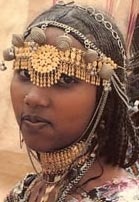 Afari woman
|
Claiming to be descendents of Ham, Noah’s son, the Afar (Danakil) of Ethiopia have had a very turbulent history. The Afar are a proud people, valuing power and prestige, the latter which many times comes from killing one’s enemies. Other groups of Afar can be found in Djibouti, Somalia and Eritrea. As the Arabic word “danakil” is an offensive term to them, members refer to themselves as the Afar.
The Afar are divided into two groups: the Asaemara, prestigious and powerful nobles who primarily live in Assayita; and the Adaemara, commoners who live in the desert area of the Afar Plain (a.k.a. Danakil Desert). One specific area of this desert land is the Danakil Depression, a vast plain of salt pans and active volcanoes which lies two hundred feet below sea level. Here, the daily temperature can reach 52 degrees Celsius (125 degrees Fahrenheit).
Most Afar are nomadic, herding sheep, goats, cattle and camels. Those who are not herdsmen earn a living by harvesting slabs of solid salt during the dry season. A few Afar work in the country’s capitol, Addis Ahaba, where they hold government jobs. Of those who live in the desert, many live in oval-shaped huts called ari, which are made of palm mats and are easily moved. The Afar camps are surrounded by thorn barricades which protect them from wild animals and enemy tribesmen.
Afar marriages are typically monogamous and girls may marry as early as the age of ten. Marriages between first cousins are preferred and the presence of someone able to read the Koran is required at the marriage ceremony.
Meat and milk are staples of the Afar diet, with milk serving a dual role as a social offering. When a guest is given fresh warm milk, the host is implying that they will provide immediate protection for the guest. If the guest is killed while under that protection, it is imperative the host avenge the person’s death.
Since the tenth century, when the Afar converted to Islam after making contact with Arabs, Islam has played an important role in the lives and beliefs of this people group. It is estimated that the vast majority of Afar are Muslim. However, their faith is highly syncretic and includes pre-Islamic beliefs, including the belief that certain trees and groves have sacred powers. Older customs are also practiced, including an annual offering to the sea to ensure safety for the villages during the November rainy season. Because spirits of the dead are thought to be very powerful, an annual Rabena, or “feast of the dead,” is celebrated.
The Afar of Ethiopia are in desperate need of hearing the gospel. It is thought that only one percent of the Afar are Christians. Portions of the Bible have been translated into Afar.
For more information on the Afar (Danakil) of Ethiopia, visit:
For ministry-related information on the Afar (Danakil) of Ethiopia, visit:
www.ksafe.com/profiles/p_code5/1704.html
www.2001pray.org/PeopleGroups/Afar.htm
www.peopleteams.org/Selection.htm and click on specific region of the world (North Africa and Middle East to learn more about the Afar)
(Information compiled from www.joshuaproject.net/)
(Note: The website links above are intended to provide you with more information about this people group. Some of the links are to groups that are not religious in nature but who provide information and background that may be helpful in researching this people group. The content of each of the websites linked to is the sole responsibility of the linked-to organization. Views expressed on these websites do not necessarily reflect the opinions and beliefs of the staff or writers of Lausanne World Pulse or those of the Lausanne Committee for World Evangelization, Institute of Strategic Evangelism, Evangelism and Missions Information Service or Intercultural Studies Department.)

